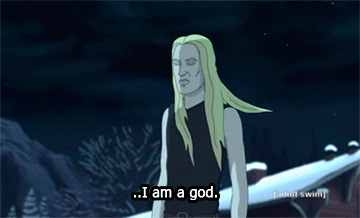
Recently, I was super disappointed in a book about black women in the heavy metal music scene. However, I was delighted (and terrified) to discover just how brutal Daphne du Maurier’s novel Jamaica Inn is. It’s so brutal it’s metal. Thus, I’m going to use gifs from the Adult Swim show Metalocalypse, which is about the world’s greatest (and fictitious) metal band, Dethklok, to help me.

Mary Yellan is twenty-three. It’s circa 1815 in Cornwall, England, which means things ain’t good for single women. Though her mother was able to sustain a small farm for a several years after the death of her husband, after Mary’s mother dies the neighbors up and sell the place without consulting the remaining resident. I guess they could do that back then.
We meet Mary as she rides in a rickety, freezing carriage in the most hellacious rain storm ever from her home to Bodmin Moor, an actual dreary place of about “twenty-odd mile of moor,” with marshes to swallow you (or your murdered corpse) whole without evidence. She is to live with her mother’s sister, Aunt Patience, who married Joss Merlyn since Mary last saw her about ten years ago. My, how marriage to a man like Joss, and at a place like Jamaica Inn, changes a woman. . .

Jamaica Inn is feared by most everyone. No one patronizes the place, begging the question: how does an inn without patrons survive? You may better ask how anyone survives in this du Maurier tale. Joss Merlyn is one of the scariest characters I’ve ever encountered in fiction:
He was a great husk of a man, nearly seven feet high. . . . He looked as if he had the strength of a horse, with immense powerful shoulders, long arms that reached almost to his knees, and large fists like hams. . . . [H]is nose was hooked, curving to a mouth that might have been perfect once but was now sunken and fallen, and there was still something fine about his great dark eyes, in spite of the lines and pouches and the red blood-flecks.

Okay, Joss is giant. What’s the big deal? He also does creepy things like this: “. . . thrusting his face into Mary’s and laying one great finger across her mouth [he asks] ‘Are you tame, or do you bite?'” So, he’s a brazen uncle. And maybe this would pass with, I dunno, someone, but everyone Mary met on her way to Jamaica Inn warned her that it was a deadly place with an evil proprietor.
Maybe it’s my experience reading No Visible Bruises, which I’ve mentioned about 1,000 since I read it, but I was quaking the way Joss set down rules for Mary that include the threat of bodily and mental harm:
“I tell you what it is, Mary Yellan,” he shouted. “I’m master in this house, and I’ll have you know it. You’ll do as you’re told, and help in the house and serve my customers, and I’ll not lay a finger on you. But, by God, if you open your mouth and squark, I’ll break you until you eat out of my hand the same as your aunt yonder.” (emphasis mine)

The man fears nothing, and though Mary says that she would race to the police to tell on him if he did something bad to Aunt Patience and then return to be broken, you can’t help but feel like this tenacious young woman is an idiot. The atmospheric setting of fog, rain, and marshes, an empty tavern and rooms not fit to be let, all create an electricity running through each sentence that made me fearful, as if I were the one staring down the blood-shot eyes of the giant Uncle Joss.
Mary has to snoop around despite being threatened to stay in her room and hide under her blankets if she hears anything odd at night. When horses and men arrive at ungodly hours, she learns just a modicum of the evil her uncle capable of. One man won’t help the other men in whatever it is they’re doing (the big reveal hasn’t happened yet). Joss Merlyn replies to his protests:
“Have a care,” [Joss] said softly. “I heard another man say that once, and five minutes later he was treading on air. On the end of a rope it was, my friend, and his big toe missed the floor by half an inch. I asked him if he liked to be so near the ground, but he didn’t answer. The rope forced the tongue out of his mouth, and he bit it clean in half. They said afterwards he had taken seven and three-quarter minutes to die.”

Mary wants to run away but can’t for two things: Aunt Patience can’t be left behind, and Mary doesn’t know who all is involved in whatever Joss is doing. It seems to be everyone in the area, and even the magistrate or a simple peddler could be loyal to Joss. It is when she is lost on the moors for hours that Mary is saved by Francis Davey, a vicar from a nearby village/civil parish called Altarnun. He’s an albino, a physical trait du Maurier uses to “other” him. But does she mean to warn us or make us unnecessarily fearful with his physical description? Give that the novel was published in 1936, it could be either.
Jem Merlyn is Joss’s much younger brother. He’s a jolly thief who knows Joss’s secrets (so can he be trusted, and is he involved?), but he’s taken a liking to Mary. His good looks (though similar-ish to Joss’s facial features so we never forget with whom we are dealing) capture Mary’s heart in a way that makes her angry. Why do we like one person, even when we shouldn’t, she asks. When Jem and Mary run off to a fair in Launceston without telling Joss, they have a splendid time, making this reader root a bit for Mary and the scalawag who sells a horse owner his own stolen (and dyed) animal back. What a riot to Mary and Jem! But Jem disappears, leaving Mary in a town she doesn’t know in the pouring, hellacious rain, miles from home or a trusted face. How will she get back before Joss discovers her absence and utterly destroys her?

It’s hard to tell who is flawed but good versus good but hiding their relationship with Joss. Whenever I felt mildly lulled into thinking Mary would survive, something violent would be revealed or said. I feared for Mary on every single page, frequently stopping to read a particularly brutal passage aloud to my husband (such as the hanging paragraph above) so we could sit there and stare, mouths agape, at each other. Oh, you learn Joss’s secret, the one that plagues his dreams when he’s drunk but doesn’t make him bat his eye while sober. It’s one of the worst I’ve read and it utterly terrified me for both it’s horribleness and people’s willingness to participate without remorse.

Jamaica Inn is highly recommended, and I can easily see me reading it again in the near future. Dare I say I was more engrossed than when I read Rebecca? I dare. I was worried I wouldn’t be able to do the review justice because the book affected me greatly. Fortunately, there are people who specialize in brutal to help us along.


More engrossing than Rebecca? Now I’m even more intrigued.
LikeLike
Excellent review of a wonderfully thrilling novel. I much preferred this to Cousin Rachel even though it had me holding my breath several times wondering how this poor girl was going to get away from her brutish uncle
LikeLike
I’m basically planning to read all of du Maurier as soon as possible after this book. I was on pins and needles the whole time!
LikeLike
Amazingly I have yet to read Rebecca….
LikeLike
Rebecca is much longer and a slow, atmospheric burn. So, it depends on what you’re looking for!
LikeLike
I can manage anything atmospheric….
LikeLike
Wow, this sounds incredible! Worrying about the MC on every page sounds like an incredible amount of tension. And of course, that it might top Rebecca is great motivation to pick this one up! Fantastic review.
LikeLike
Thanks! Mary was so determined but realistic and unwilling to be bullied. But sometimes, even when a character stands up for herself she doesn’t realize how bad it could get when the person threatening her has nothing to lose.
LikeLiked by 1 person
Great review! Rebecca is my favorite, but Jamaica Inn is definitely engrossing.
LikeLike
Jamaica Inn is one of those books that makes me want to throw out spoilers all over the place! Rebecca seemed less about the twist at the end with Max and Rebecca that the atmosphere and how the narrator felt.
LikeLiked by 1 person
Ok so now i’m a bit disappointed-Jamaica Inn doesn’t take place in Jamaica????? A little tropical setting may have lightened the mood considerably…
LikeLike
It was so misty and rainy. I think tropical settings can get humid and misty, so either way, everyone is getting wet just by walking outside! I’m not sure why it’s named Jamaica Inn.
LikeLiked by 1 person
Whoooaaaa better than Rebecca?! High praise! This sounds like the perfect book to pick up around the fall months around Halloween. I like my books creepy, but I still want to be able to sleep at night. It sounds like this is more unsettling? You’ve got me very interested now 🙂
LikeLike
I would say scary, not unsettling. Like, I’m constantly thinking the uncle is going to hang his niece and time how long it takes her to bite off her damn tongue. SCARED!
LikeLiked by 1 person
Women had only limited property rights in 1815, which I guess is Du Maurier’s point, and very few ways to support themselves independently. Love your descriptions. I’ll chase my library up for an audiobook copy.
LikeLike
Bill, I hope the audio book narrator adds some real pathos to the story! It’s very good on page, and so a good voice actor would take it to a new level.
LikeLike
Oh wow, better than Rebecca?! I haven’t read this one yet – actually haven’t read any du Maurier but Rebecca (which I loved) and I keep meaning to pick this one up! It sounds quite intense!
LikeLike
This is only the second du Maurier I’ve read. It was a great next step after Rebecca!
LikeLike
[…] of Murder Lane, past the Break-Their-Arms-and-Legs Village. Daphne du Maurier’s horror novel Jamaica Inn was much more violent and terrifying than I bargained […]
LikeLike
I really enjoyed the first two du Maurier novels I read (Rebecca and Frenchman’s Creek), though they were extremely different from one another. It sounds like this is different again (and very scary)!
LikeLike
What genre is Frenchman’s Creek, would you say?
LikeLike
If you were more engrossed than Rebecca I’ll definitely have to pick this up at some point. Your GIFs were lost on me. Lol.
LikeLike
Everything is brutal when you’re a member of the world’s most metal band.
LikeLike
[…] it doesn’t hurt if someone is the victim of a gruesome murder, but thinking back, I labeled Jamaica Inn by Daphne du Maurier horror because I was horrified most of the […]
LikeLike